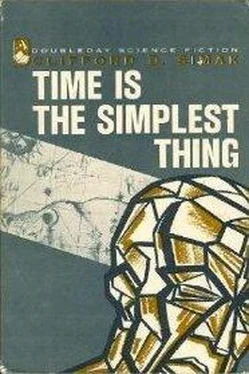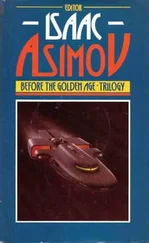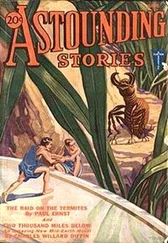“I hear there are a lot of preachers.”
“Yes, a lot of them. But all they do is talk. This one, he is all set to get some action on it.”
“There she is,” said Blaine, loosening the last bolt. He broke open the carburetor and looked at it.
“There it is,” he said.
The man bent over and looked where Blaine was pointing.
“Damned if it ain’t,” he said.
“Have it fixed and back in place in another fifteen minutes. You got an oil can we can squirt these threads.”
The driver got up and wiped his hands on the seat of his trousers. “I’ll look it up,” he said.
He started for the truck, then turned back. He held out his hand. “My name is Buck,” he said. “Buck Riley.”
“Blaine. You can call me Shep.”
They shook.
Riley stood undecided, shuffling his feet.
“You say you’re heading for Dakota.”
Blaine nodded.
“I’m damn near out of my mind,” said Riley. “I need someone to help me.”
“Anything I can do to help?” asked Blaine.
“Would you drive at night?”
“Hell, yes,” said Blaine.
“You could drive and I could have the shotgun ready.”
“You’ll need to get some sleep.”
“We’ll manage that, the both of us, somehow or other. We have to keep this wagon rolling. I’ve lost too much time for comfort.”
“You’re going South Dakota way?”
Riley nodded. “You’ll go with me, then?”
“Glad to,” said Blaine. “It beats walking any time.”
“There’ll be some money in it for you. Not much . . .”
“Forget about the money. I just want the ride.”
Northeastward out of the southwest they traveled, driving day and night — but not driving all the time; driving, more than likely, not more than half the time. For the truck was no better than a rolling junk heap. They fought with the balky engine, they battled with the old and wornout tires, they nursed the shaky chassis — and they made some mileage, but not so very much.
The roads were bad, as all roads now were bad. Dead for many years was the old concept of smooth, hard-surfaced, almost polished highways, for they were no longer needed. The traffic in this day was made up almost entirely of cars and trucks that were half planes; there was no need of good roads for vehicles which in their operation never touched the ground.
The old highway surfacing was broken and full of chuck-holes. It was rough on tires, and the tires were not too good. Nor were new ones, even if Riley had been able to afford them, easy to obtain. The demand for tires of the type used by his battered truck had dropped to almost nothing, and it was only by the greatest luck that they could be found.
There also was another ever-present worry — the finding of gasoline to put into the tank. For there were no service stations; there had been no service stations for almost fifty years. There was no need of service stations when highway traffic moved on atomic power. So, at each town they hunted for a farm service store or a co-operative tank farm to obtain their fuel, for the bulk of farm machinery still used gasoline.
They slept as they could, snatching catnaps whenever the chance came up. They ate on the run, usually out of a paper bag of sandwiches or of doughnuts, with coffee in an old tin pail they carried.
Thus the two of them found their way along the ancient highways, used now by the modern traffic only because the engineering of those highways had been good, only because they represented the easiest, shortest distances between two points.
“I never should have took this job,” said Riley, “but there was good pay in it and I don’t mind telling you that I need the money.”
“You’ll probably make out all right on it,” Blaine reassured him. “You may be a few days late, but we’ll get through all right.”
“If I have any truck left.”
“You didn’t,” Blaine pointed out, “have very much to start with.”
Riley mopped his face with a faded handkerchief that at one time had been turkey red.
“It’s not only the truck and all the work,” he said. “It’s the wear and tear on a man himself.”
For Riley was a frightened man — and the fright, Blaine saw, went down to the bone and core of him.
It was not, Blaine told himself, watching the man, the simple emotional mechanics of a man frightened by the horrific menagerie of mischief and of evil from which, because he had believed in it for his entire life, he could conjure up with no effort whatsoever the terrible fantasies of an age gone past. It was something more than that; it was more immediate than latent nighttime fears.
To Blaine the man was an oddity, a human specimen out of some medieval museum; a man who feared the dark and the imagined forms with which he peopled it; a man who placed reliance in a painted hex sign and in a shotgun loaded with a charge of silver buckshot. He had heard of men like this but had never met one. If there had been any such as this among the people that he met in Fishhook, they had kept it closely hidden behind a sophisticated mask.
But if Riley was a curiosity to Blaine, Blaine was likewise one to him.
“You are not afraid?” he’d ask.
Blaine would shake his head.
“You do not believe these things?”
“To me,” Blaine would tell him, “they have always seemed just a little foolish.”
Riley would protest: “They are not foolish, friend. I can assure you that. I’ve known too many people; I’ve heard too many tales that I know are true. There was an old man when I was a boy back in Indiana. He was found tangled in a fence with his throat ripped out. And there were tracks around the body and the smell of sulfur.”
If it were not this particular story, then it was another, just as gruesome, just as starkly mystic, just as ancient-dark.
And what could one do with that? Blaine wondered. Where would one find an answer? For the belief — the will to believe — was engrained deeply in the human fiber. Not entirely, either, in the matrix of the present situation, but in the blood and bone of Man clear back to the caves. There was in the soul of Man a certain deadly fascination with all things that were macabre. The situation as it stood had been grasped willingly, almost eagerly, by men for whom the world had become a rather tame and vapid place with no terror in it beyond the brute force terror of atomic weapons and the dread uncertainty of unstable men in power.
It had all begun quite innocently as the people grabbed at the new principles of PK for their entertainment and their enjoyment. Almost overnight the fact of mental power had become a fad that had overwhelmed the world. Night clubs had changed their names, there had been startling fashion trends, new teen-age cants had risen, TV had gone overboard with its horror films, and the presses had poured out billions of volumes dealing with the supernatural. There had been new cults, and older cults had flourished. The ouija board came back after two centuries of hiding in the mists of an earlier age which had played with ghosts for kicks but had given up when it had found that you could not play with the spirit world. You either believed in it or you didn’t and there was no middle ground.
There had been quacks and there had been earnest men, considerably deluded, who had made names and fortunes from the fad. Manufacturers had turned out carload after carload of novelties and equipment for the pursuance of this new fad, or new hobby, or new study or religion — the specific term would apply in direct proportion to the seriousness with which each individual might consider it.
It all had been wrong, of course — for paranormal kinetics was not supernatural. Nor was it macabre, nor did it deal with ghost or devil or any of the other of the hordes of forgotten things which came charging happily out of the Middle Ages. It was, instead, a new dimension to Man’s abilities — but the enamored people, agog at this new toy, had adopted it wholeheartedly in all misinterpretation.
Читать дальше








